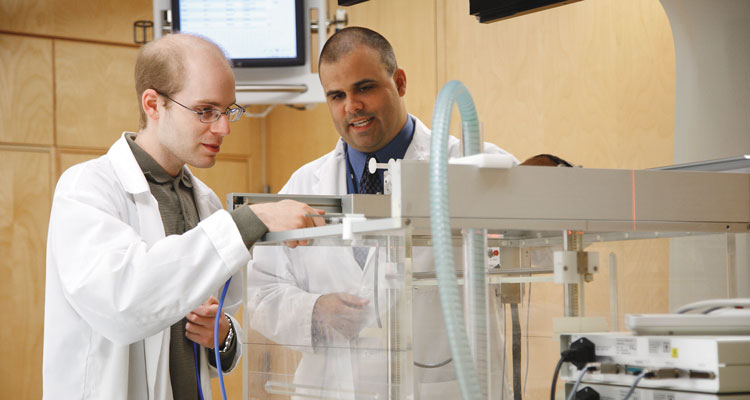
Medical physicists are health care professionals with specialized training in the medical applications of physics —specifically applied to the treatment of cancer using radiotherapy and also in the field of medical imaging.
Medical physicists use their deep knowledge of physics and the effects of physical systems on the body to improve human health. Medical physicists are involved with patient care, research into new medical technologies, and teaching. There are four sub-specialties of medical physics and all of these are taught as components of the UWindsor medical physics undergraduate degree program. Diagnostic medical physicists optimize diagnostic image quality, develop new imaging technology, and monitor the radiation safety of current technologies (e.g. x-rays, ultrasound, CT, MRI). Nuclear medical physicists develop and monitor the use of radionuclides for imaging (e.g. PET imaging). Therapeutic medical physicists, working mainly on the treatment of cancer, develop new radiation treatment technology, collaborate with radiation oncologists, and monitor equipment to ensure each patient’s safety. Medical health physicists monitor the use of radiation to protect non-patients (e.g. nurses, doctors, visitors, everyone but the person being treated with radiation). In addition, medical physicists can work in industrial radiation safety departments and private sector research and development laboratories.
The medical physics stream is designed specifically to give students a competitive advantage to be accepted into an accredited medical physics graduate program – required to practice in hospitals. The program is flexible enough to cover the requirements for admission into professional schools or physics gradate programs in Canada and the United States.
Program Description
While the study of physics allows us to understand how the universe works, medical physics emphasizes the application of physics ideas and technology to the diagnosis and treatment of diseases in the human body, particularly cancer, as well as the visualization of these diseases via modern medical imaging techniques.
Medical physics students are thoroughly prepared with the same courses and skills in scientific experiments, computation, and mathematics as other physics students (leaving many options open to them), but, in addition, they specialize in the core areas of medical imaging (MRI, ultrasound, CT, nuclear medicine) and radiotherapy (the treatment of cancer with external beam radiation or implanted radioactive sources). Three required specialized courses, “Introduction to Medical Physics,” “Radiological Physics” (with laboratory), and “Medical Imaging” (with laboratory) deliver this content. Laboratory classes are taught in part at the Windsor Regional Cancer Centre and housed in the Baker Laboratory for Medical Physics Education on campus. Elective courses allow students to delve deeper into the topics of radiobiology, magnetic resonance imaging (MRI), and ultrasound. In addition, medical physics students take required courses in the biological sciences and biochemistry to more thoroughly understand the effects of radiation on the human body.
Our Honours Medical Physics program is designed to prepare you for graduate studies in medical physics, which will eventually lead to a career as a certified medical physicist. Graduates of the program have also gone on to medical school and other careers in physics.
The Honours Medical Physics stream fits naturally into our internationally renowned physics department. We collaborate closely with such local health-care institutions as the Windsor Regional Cancer Centre, the Henry Ford Hospital, and the University of Windsor Institute for Diagnostic Imaging Research to deliver a practical, highly up-to-date, and relevant curriculum.
The program of study is carefully crafted to retain all of the physics and mathematics contained in a traditional physics degree (allowing maximum career flexibility), while, at the same time, introducing critical new content in biology, biochemistry, and specialized areas of medical physics. Both thesis and co-op options are offered.
Experiential Learning
Our undergraduates gain valuable research/work experience by getting involved in Physics research as early as their first year. Students have experiential learning opportunities through co-op placements in Windsor and across Canada and US, the university’s Outstanding Scholars program, thesis courses for credit, summer placements and volunteer activities.
Our students work with experts in such diverse fields as: acoustic microscopy and materials characterization; nanoscale electronics; quantum control and quantum computing; atomic, molecular and optical physics; theoretical condensed matter physics; astroparticle physics; biophysics and medical physics, including magnetic resonance imaging; and attosecond and ultrafast laser physics.
Student Support
Our close-knit, collegial student body organizes and leads our Physics Club, where students get together to promote interest in physics, help each other through their studies and socialize outside of the classroom setting. Our Science Resource Centre provides free tutoring for first-year courses.
Career Paths
Career opportunities are available immediately upon graduation. However, students may wish to acquire full professional certification as a medical physicist by completing a CAMPEP-accredited graduate program available at several universities across Canada. The final step in the qualification process is the completion of a CAMPEP-accredited residency to be eligible for Board certification with either the Canadian College of Medical Physicists (CCPM) or the American Board of Radiology (ABR).
Our graduates have been accepted to accredited programs at Wayne State University, McGill University, the University of Calgary, Western University, as well as the University of Toronto and the University of Ottawa. This preparation may lead to a career as a licensed medical physicist (hospital or clinic).
Other careers include:
- Industrial/research medical physicist (medical technology company)
- Government and clinical laboratories
- Graduate studies (MSc or PhD) in physics/astronomy
- Professional schools such as medicine, dentistry, pharmacy, optometry, and medical physics
- Computer programming/software development
- Financial services
- Entrepreneur, business
- Education (with additional studies)
- Law (with additional studies)
Admission Requirements
All physics programs have a mean admission average of 89% and a minimum admission average of 75% + 70% second science/math. ENG4U, MHF4U and SPH4U are required. MCV4U is strongly recommended and SCH4U is recommended.


